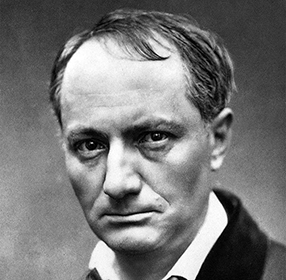Spleen
(I)
February, peeved at Paris, pours a gloomy torrent on the pale lessees of the graveyard next door and a mortal chill on tenants of the foggy suburbs too. The tiles afford no comfort to my cat that cannot keep its mangy body still; the soul of some old poet haunts the drains and howls as if a ghost could hate the cold. A churchbell grieves, a log in the fireplace smokes and hums falsetto to the clock's catarrh, while in a filthy reeking deck of cards inherited from a dropsical old maid, the dapper Knave of Hearts and the Queen of Spades grimly disinter their love affairs.
(II)
Souvenirs? More than if I had lived a thousand years! No chest of drawers crammed with documents, love-letters, wedding-invitations, wills, a lock of someone's hair rolled up in a deed, hides so many secrets as my brain. This branching catacombs, this pyramid contains more corpses than the potter's field: I am a graveyard that the moon abhors, where long worms like regrets come out to feed most ravenously on my dearest dead. I am an old boudoir where a rack of gowns, perfumed by withered roses, rots to dust; where only faint pastels and pale Bouchers inhale the scent of long-unstoppered flasks. Nothing is slower than the limping days when under the heavy weather of the years Boredom, the fruit of glum indifference, gains the dimension of eternity . . . Hereafter, mortal clay, you are no more than a rock encircled by a nameless dread, an ancient sphinx omitted from the map, forgotten by the world, and whose fierce moods sing only to the rays of setting suns.
(III)
I'm like the king of a rainy country, rich but helpless, decrepit though still a young man who scorns his fawning tutors, wastes his time on dogs and other animals, and has no fun; nothing distracts him, neither hawk nor hound nor subjects starving at the palace gate. His favorite fool's obscenities fall flat —the royal invalid is not amused— and ladies in waiting for a princely nod no longer dress indecently enough to win a smile from this young skeleton. The bed of state becomes a stately tomb. The alchemist who brews him gold has failed to purge the impure substance from his soul, and baths of blood, Rome's legacy recalled by certain barons in their failing days, are useless to revive this sickly flesh through which no blood but brackish Lethe seeps.
(IV)
When skies are low and heavy as a lid over the mind tormented by disgust, and hidden in the gloom the sun pours down on us a daylight dingier than the dark; when earth becomes a trickling dungeon where Trust like a bat keeps lunging through the air, beating tentative wings along the walls and bumping its head against the rotten beams; when rain falls straight from unrelenting clouds, forging the bars of some enormous jail, and silent hordes of obscene spiders spin their webs across the basements of our brains; then all at once the raging bells break loose, hurling to heaven their awful caterwaul, like homeless ghosts with no one left to haunt whimpering their endless grievances. —And giant hearses, without dirge or drums, parade at half-step in my soul, where Hope, defeated, weeps, and the oppressor Dread plants his black flag on my assenting skull.
Credit
Originally appeared in Les Fleurs du Mal, translated by Richard Howard and published by David R. Godine. © 1982 by Richard Howard. Reprinted in Other Worlds Than This, published by Rutgers University Press, 1994. Used with permission of Rutgers University Press. All rights reserved.
Date Published
01/01/1982

